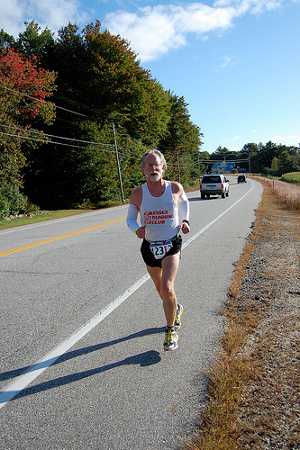Increase Your Running Endurance
5 stamina-enhancing tips to keep you running longer
 "Increase your running endurance" courtesy of teddyb
"Increase your running endurance" courtesy of teddybDr Martin Fryer was 46 years old, a veteran of ultra-marathons. He had a huge challenge ahead of him: to run 200 kilometres on a treadmill against two other runners (a promotional event in a shop window!) and win.
I didn't know he'd been listening to my running endurance hypnosis download for three weeks on the other side of the world in Australia in preparation for his epic event. But what he later described amazed even us! More on Martin in a moment.
If you want to get the psychological edge (bearing in mind that the mind will always influence the body), then try these tips to up your running endurance to get fitter and/or to perform better in races and even smash records.
1) Pace yourself
Sounds so obvious, doesn't it? But I don't just mean avoid going off too fast, peaking too soon, and becoming exhausted too quickly. Decide ahead of time how fast you're going to run at any given point. For example, if you need to 'jostle for position' early on in a race, it will help to train by factoring in a fast couple of minutes as you start to run before settling down into a more moderate cruising speed. Then you might have to kick and really sprint to the line. Races shouldn't feel like a shock to the system, but they will do if you just train in one gear.
2) Get with the beat
Music tempo and beat has a definite impact on how energetic people feel and how fast they run, as well as on their endurance levels. A Brunel University study in the UK in 2007 found that music can increase endurance by up to 15% (1). So training with music playing may boost your performance no end. But Queen's "We Will Rock You" might be a better choice than Beethoven's "Moonlight Sonata".
Music can also create a more positive mood whilst you are running. Since good feelings are likely to evoke a greater desire to want to repeat the activity more often, this is a positive step toward exercising consistently and can ramp up your self-discipline, too.
3) Keep hydrated and eat well
At the risk of a clichéd analogy, it's no good driving your car without enough fuel to get you to where you need to go. Of course it's the same with your body. Keep your water levels topped up in the hours before and after you run, and eat a balanced diet that is consistent and doesn't constantly spike your blood sugar and insulin levels, leading to sudden dips in energy.
4) Give yourself a break
Don't run hard and far every day. Take time out to rest your body and let it fully recuperate. Running large distances puts strain on every part of you, so get used to seeing quality rest as a vital part of your training, rather than 'a missed training opportunity'.
But also 'give yourself a break' sometimes. Perfectionism is a trap that can actually worsen performance in the long term. I knew a woman who was a brilliant tennis player but she stopped playing because she lost a game! That's right: one game!
Allow yourself to have days when you don't feel quite so 'into it'. That's fine. Perfectionism can lead people to quit running altogether just because they have a couple of sub-perfect runs. Recognize that you are human and make allowances for yourself so that, in the long run (so to speak), you can improve.
5) Use fantasy to get into the zone
I love those moments when awareness of running seems to disappear and I go into a state of pure flow - also known as 'getting into the zone'. A sense of wonderful detachment and ease, almost as if the running is just taking care of itself, and awareness of time seems to fade away as I go into a trance-like meditative relaxed state even as my body is running smoothly and powerfully.
I've found a great way to enter the zone in this way is to use fantasy. So I might imagine that I am running from captors after having escaped. Perhaps they will not be aware of my escape for half an hour and I need to get as far away as possible in that time frame. Doing this helps bring a sense of context and meaning to my running and I've found using the imaginative mind in this way helps me go faster and further.
Ah, I almost forgot. How did Martin do in his 24-hour treadmill challenge? He wrote to us, so in Martin's own words:
"My goal was to cover over 200 kilometres in 24 hours but I ended up running the strongest and smoothest I have ever felt and won the race with a total of 245.92 kilometres which was only 1.7K off the World Record and the third biggest total of all time!"
Martin's full testimonial is here.
Of course your body needs to be trained and genetics play a part; but all things being equal, having the mental edge can sometimes make all the difference.
References
- See: Psychological effects of music tempo during exercise. Karageorghis, C, Jones, L, Stuart, D P. 2007. International Journal of Sports Medicine. 2007(28) 1–7.



